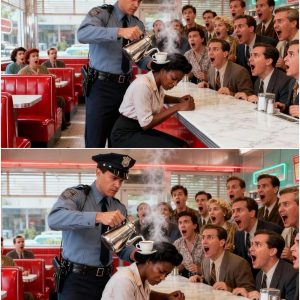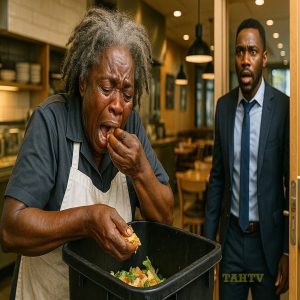You don’t deserve leftovers, sir,” the waitress said to the homeless man stood at the center of an expensive Lagos restaurant holding a small wrinkled 200 naira note in his shaking hand. A kind-eyed waitress named Amanda had just placed a hot pack of jolof rice and chicken and a bottle of water in front of him. “Sir,” she said softly, “this is not leftover food.
You deserve real food.” The man’s eyes widened. For a second, he could not breathe. What she did left him cold, frozen with shock. Phones were up. People stared. The restaurant owner, Madame Amaka, frowned from behind the counter. Then the man reached for his beard. It peeled away. Gasps rose like a wave. Amanda’s lips parted. The whole room holding its breath as the fake hair dropped to the shiny floor.
How did we get here? It started that morning in a quiet, bright room high above Victoria Island. The city of Lagos hummed below. Jerry Andrew, one of the most powerful CEOs in Nigeria, stood in front of a mirror. He was rich, famous, and respected. But today, he did not want respect. He wanted truth. Today, he whispered, “I will see kindness with my own eyes.
” He opened a black case on his table. Inside were the costumes, a tattered brown coat, a messy tangled beard, and a wild wig of rough hair. He put them on. He hid his clean shave. He shadowed his neat haircut. He smeared a little ash on his face to look tired and dusty. When he looked back at the mirror, Jerry Andrew was gone.
In his place stood a hurting man who looked like he had slept under a bridge. Jerry nodded to himself. No driver, no bodyguards showing first. No special seat, just me. He stepped into the elevator alone. The restaurant he chose was one that knew him well. On normal days, the moment he walked in, the staff would clap. A special chair near the window was always kept for him. The chef would rush out with a smile.
People would whisper, “That’s Jerry Andrew.” But not today. As the homeless man pushed the glass door, the music and chatter continued. He smelled pepper soup and grilled fish. The air was cool. The light bounced off the spotless tiles. He took one step in, then another. A young couple moved their seats away. A man in a fine suit said, “Please don’t come near me.
” He lifted his trouser hem like the homeless man was rainwater. Two girls at a back table began to giggle and record with their phones. See his hair? One said he will stain this place. Behind the counter, Madame Maraka looked up. She wore a gold scarf and a sharp smile that did not reach her eyes.
You shift to the corner,” she said, pointing toward a dark wall near the door. “Do not disturb my customers.” Jerry lowered his head and moved to the corner. His chest hurt a little, not from their words, but from what the words revealed. He had not come to punish anyone. He had come to learn. A waiter passed by, wrinkling his nose.
Another one hissed like air escaping a tire. Jerry swallowed. He knew his lines. He had practiced them because today had a plan. He stepped forward, voice soft. Please, I have not eaten in 2 days. His hands shook as he held up the small crumpled note. Take this 20 naira and and please give me leftovers. Just leftovers so I can eat.
I am I am hungry. The room burst into laughter. 20 naira? Someone shouted. That cannot buy water. Oh god. another said, holding his stomach, laughing harder. Leftovers. He wants to eat people’s remnant. Even Madame Maraka laughed. We do not sell leftovers here. She said loudly so everyone could hear. Go outside and look for dust bin if that is what you want….

Amanda, the waitress who had been wiping down a nearby table, froze.
Her eyes darted from the old man’s trembling hand to Madame Amaka’s smirk — then to the crowd, laughing and filming like it was a circus.
Something inside her broke.
She took one deep breath, walked to the counter, and said quietly,
“Madam, I’ll pay for his food.”
The laughter faltered.
Madame Amaka frowned. “Excuse me?”
Amanda met her gaze. “You said we don’t serve leftovers. Good. Then I’ll buy him real food. A full meal. From my own salary.”
A hush fell over the restaurant. The young waitress — barely twenty-three, earning just enough to survive — picked up a clean plate. Her hands shook slightly as she scooped steaming jollof rice, added two pieces of chicken, and poured cold water into a glass.
She walked to the man, placed it before him, and whispered,
“Sir, this is not leftover food. You deserve real food.”
The laughter died completely.
The old man — his disguise perfect, his heart pounding — looked at her. For a second, he couldn’t speak.
No one had talked to him like that all day — or maybe in years.
He reached for the spoon with trembling hands. But before he could take a bite, Madame Amaka stormed over.
“What nonsense is this?!” she shouted. “Do you want to ruin the image of my restaurant? He is dirty! Throw him out!”
That’s when it happened.
Jerry slowly reached for his beard. It peeled away. Gasps erupted like thunder.
Someone whispered, “That’s… Jerry Andrew!”
Phones dropped. A waiter nearly fell backward. Madame Amaka’s face drained of color.
Jerry stood tall, his voice calm but echoing with quiet power.
“I came here today,” he said, “not as a CEO, but as a man — to see how people treat those who have nothing.”
He turned toward Amanda. “And you, young lady… are the only one who passed.”
He looked around at the stunned faces. “Do you laugh at the hungry because you think you’ll never be hungry yourself? Do you insult the poor because you believe poverty is contagious? Maybe the real poverty here,” he said, tapping his chest, “is in the heart.”
Then he turned to Madame Amaka. “Madam, I will buy this restaurant.”
Her jaw dropped. “S-sir?”
Jerry nodded. “You will receive the full payment today. And you, Amanda…” — he faced the trembling waitress — “from tomorrow, you will manage it. Call it ‘The Grace Kitchen.’ Let it feed those who can’t pay, and serve those who can with the same respect.”
Tears filled Amanda’s eyes. The room was silent except for the hum of the air conditioner.
One week later, ten SUVs pulled up outside the same restaurant. The sign above the door now read: “The Grace Kitchen — Where Every Plate Has Dignity.”
Soldiers, politicians, and businessmen came not to dine, but to serve.
Amanda stood at the counter in her new uniform, handing out hot meals to a line of homeless men and women.
A banner above her read: “You deserve real food.”
And somewhere in the crowd, Jerry Andrew smiled quietly.
Because that day, in the heart of Lagos, kindness had finally gone viral.





